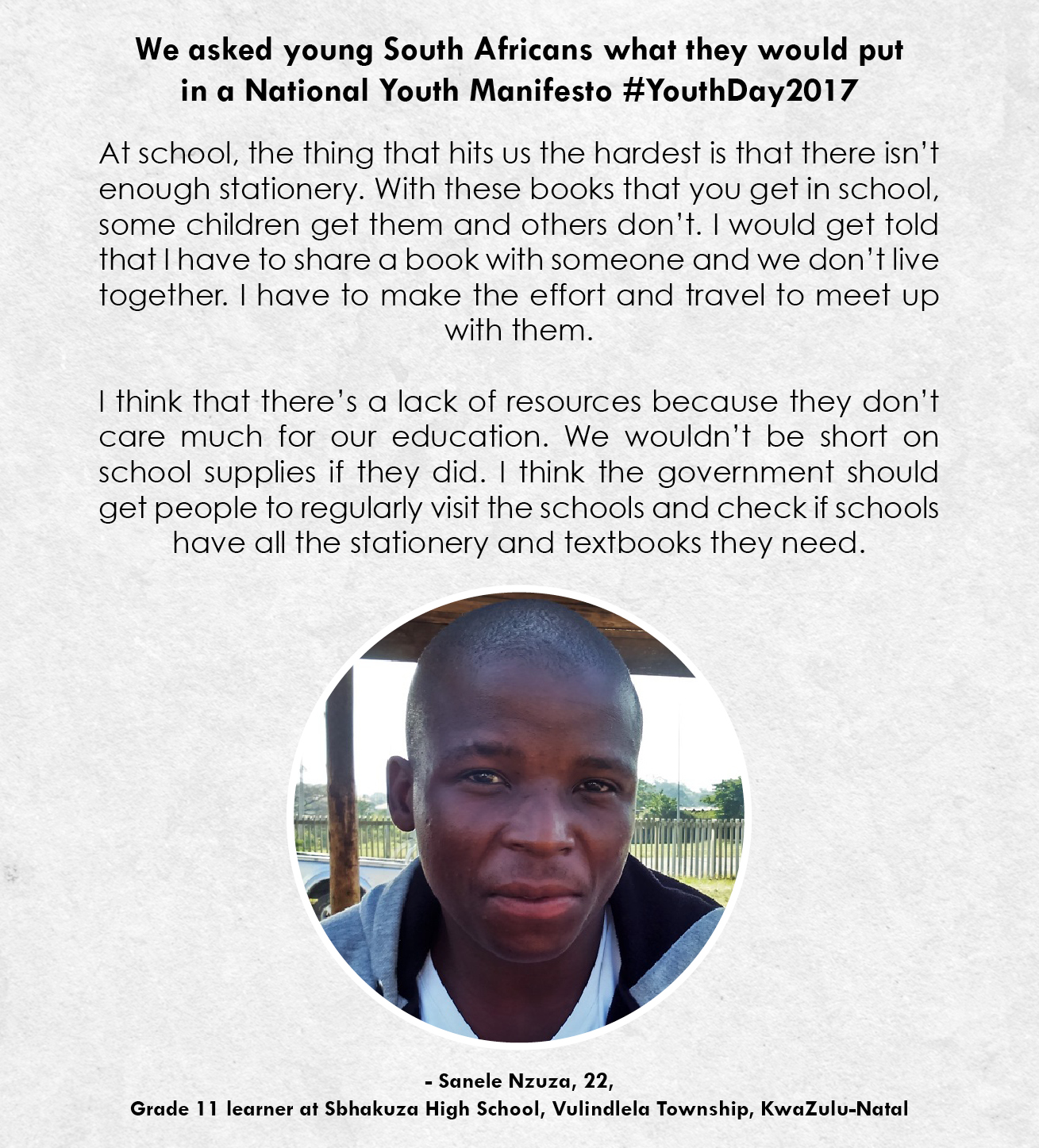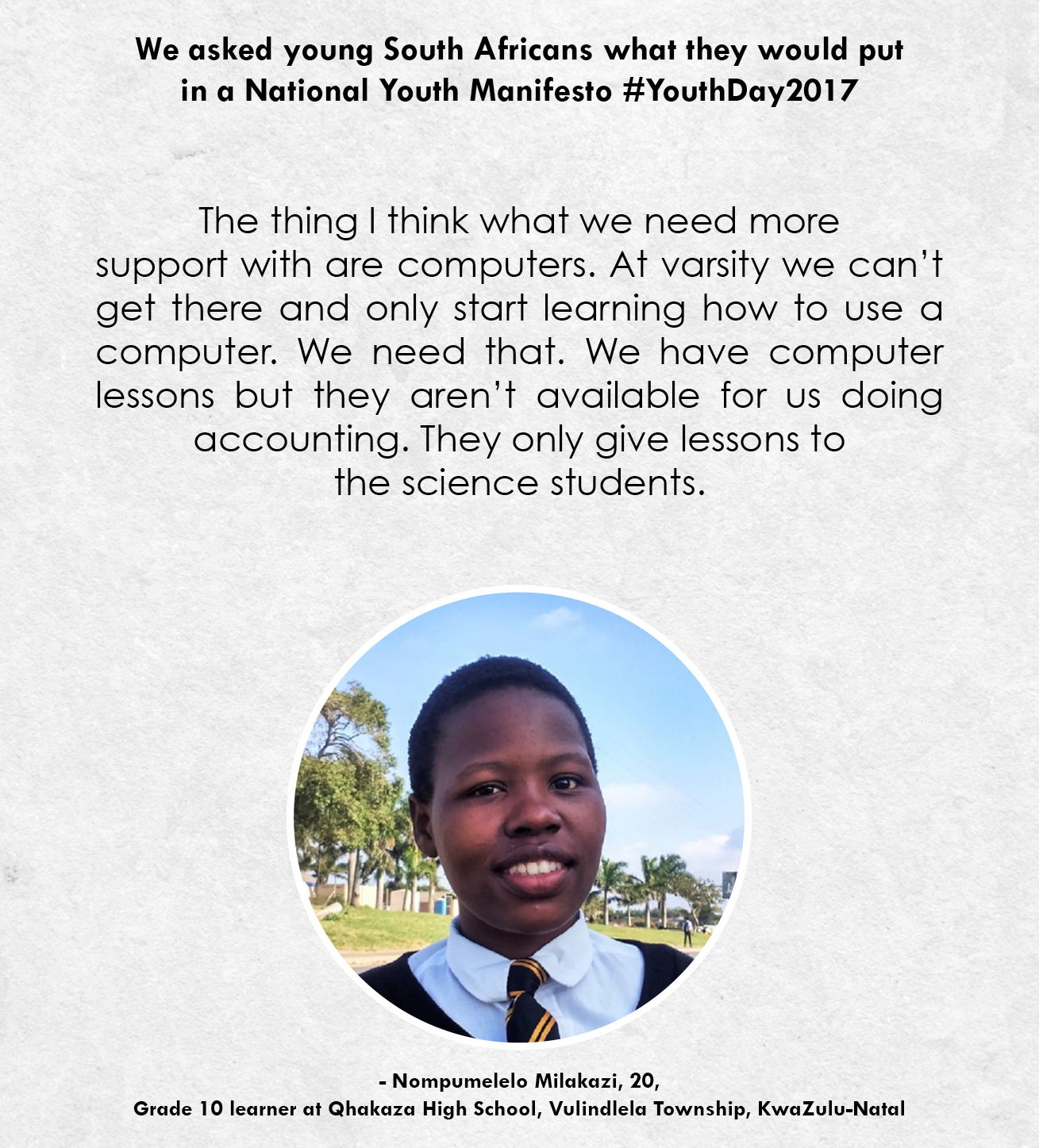On June 16, South Africa’s youth are being celebrated as the future leaders of this country. In 10 years, today’s grade 8s will be graduating from university, entering the job market and writing the next chapter of our development. But the country is falling short in meeting the needs of the youth. The Daily Vox asked young people what they would put down if they were to write a manifesto for advancing South Africa’s youth.
1. Education
Education is the key to a better life. This is what we tell children from their earliest days and what encourages them to persevere through school and university. But our education system isn’t helping many young people. The matric pass rate in 2016 was at 72.5% if you consider – progressed learners’. Of those learners that pass matric, only 3.3% of black youth and 3.8% of coloured youth move on to attend institutions of higher learning. This figure, according to Statistics South Africa, has not changed in over 12 years.
A group of grade 10 learners at Qhakaza High School in northern KwaZulu-Natal told me the abuse they receive from their teachers not only prevents them from participating in class but diminishes their confidence. “They swear at us, call us dom. You’ll end up failing and even if you don’t fail you, you still struggle with a sum on the board. I’m telling you. It doesn’t feel great at all. You’re too scared to raise your hand. I don’t even bother with participating anymore. They even tell you that you don’t belong in this class,” they said.
Sanele Nzuza, 22, a grade 11 learner at Sbhukuza High School, told me his biggest challenge at school is having to share textbooks. “I would get told that I have to share a book with someone and we don’t live together. I have to make the effort and travel to meet up with them,” he said.
If this is what our youth have to contend with at school, we shouldn’t be surprised at low pass rates.
The youth deserve an education system that is accessible, well resourced and globally competitive. It must be easy for them to get into and stay in school. Their schools should have safe and well-equipped buildings with enough desks, chairs, lights, books and whiteboards for every cohort, with well-stocked labs and inviting libraries. And their teachers need to be well trained, highly motivated and ready to teach in line with international standards. More than this, they deserve supportive and nurturing teachers.
But it’s not just about academics. Their education should provide them with the skills they need to perform well in tertiary education and in adult life.
Young people deserve the space to grow and foster their creative talents. Drama, music, art, and technology classes to engage their creativity, sports clubs to foster a healthy lifestyle and hone their athletic abilities. Philosophy classes to help them critically engage with and analyse real world issues like racism, LGBTQIA+ phobias, and the patriarchal system responsible for sexism and rape culture.
Outside of the mandated school curriculum, schools should teach kids to grow and prepare their own food, how to resolve personal conflict, how to organise when dealing with government and how to navigate the state bureaucracy – whether that’s getting an ID book, passing a driving test, applying for a social grant or paying tax.
2. Healthcare
We cannot have a healthy and productive generation if we do not provide adequate healthcare for young people. It is a basic human right that is not being sufficiently met.
The youth deserve to have a healthcare system that actually cares for them. They deserve access to reliable and non-judgemental medical services in clean and efficient hospitals and clinics. Dental care and eye care services should not be neglected, and neither should mental health. Whether it is educational support services, counselling or other therapies, early intervention is key to ensuring that young people can flourish into healthy and happy adults.
Young people deserve to have access to all the necessary medicines, including contraception, that will improve their health and enable them to participate fully in society. And young women and girls deserve access to free sanitary products. A girl child’s life shouldn’t have to stop because she is on her period.
3. Social welfare
Many young people in South Africa continue to live in communities where they don’t have any support. Many young people grow up in single parent households – or in child-headed households. (According to Statistics South Africa, in 2012, only one in three children aged five and under lived with both their parents.) Others have parents who leave for work early in the morning and return late at night in order to support the family. Who do they turn to in their adolescent struggles?
Bakhaya Shandu, 16, a grade 11 student who wants to study social work once he matriculates, told me he wants to look after the people in Vulindlela Township in northern KwaZulu-Natal, his community. “[A] lot of people [here] end up delinquents. They aren’t cared for by their parents. They don’t care for them. I want to get people together and talk to them about their problems and try to help them with their lives,” he said.
Young people need to feel that they can find a genuine support base both inside and outside of their homes. It’s only with strong social support that we develop empowered, well-rounded, and confident youth.
The youth deserve to have mentors who can lend a sympathetic ear when they need advice, and social workers in every school, clinic and community to provide counselling and referrals for further care if they experience abuse or neglect at home or at school.
4. Employment opportunities
Employment is what allows people to participate in and contribute to the economy, and to find a sense of direction and purpose in life. The unemployment rate in South Africa is 27.7%, the highest it has been in the past 14 years, and youth make up a large proportion of the unemployed in the country.
Young people deserves more employment opportunities and access to these must be made easy. Sihle Mthetwa, 26, is a street vendor. He’s only had informal employment since he matriculated five years ago. Mthetwa said government needs to create more opportunities for work.
“We’re sitting at home because we don’t have the strength to study further. We also don’t know which doors we need to approach to access opportunities. We aren’t told which way to go. We usually hear after the fact that they were hiring.”
Government should be doing much more to create long-term jobs (and not just short-term “work opportunities”). In the absence of formal work opportunities, it needs to create an environment that’s more friendly to entrepreneurs and help young people learn more about entrepreneurship.
A grade 9 learner at Qhakaza High School said there should be schools that teach the youth how to make money from their talents. “We asked [our school] about setting up a school club [for entrepreneurship] but they haven’t given us the chance,” she said.
Workshops and internship programmes with big companies should also be expanded. Young people deserve the opportunity to connect with industry so they can learn firsthand what will be required of them once they are able to enter the industry.
5. Decent housing
Decent housing that is clean and safe is a basic human right that South Africa’s youth deserve. Living in overcrowded, squalid conditions is not conducive to the development of a productive youth, especially one that will be successful in school.
The youth deserve to live in clean, safe, and spacious housing, with access to all the necessary amenities, including clean running water, electricity, and adequate sanitation.
Housing should be provided close to economic opportunities and should also have well serviced transport links. Adequate space should be set aside in residential areas for schools, childcare centres, clinics, local shops and recreational spaces for different ages. Neighbourhoods should also have adequate police services. If we cannot offer safety and security to our young people, we cannot expect them to flourish into well-rounded adults.
Many young people don’t have the right to vote, others aren’t registered to vote, and still others have become so disillusioned with our democracy that they’ve avoided the polls altogether. If we are to build a robust and resilient nation, it’s time we took young people’s needs seriously and made young people’s needs an integral part of our political goals.











